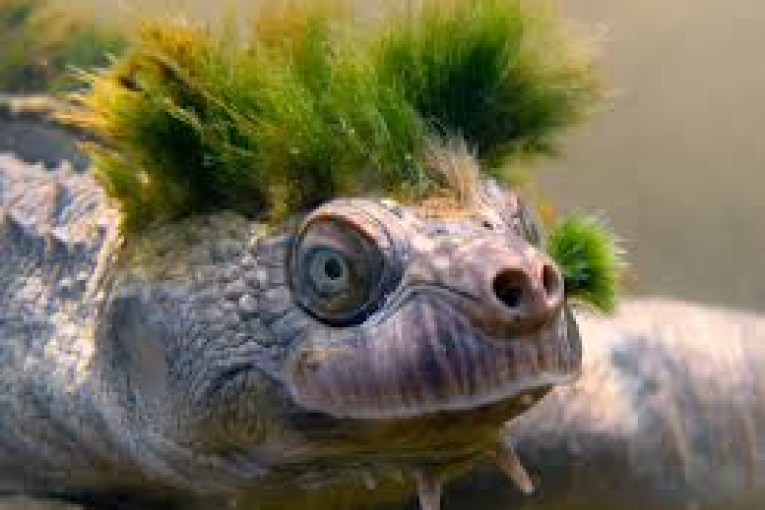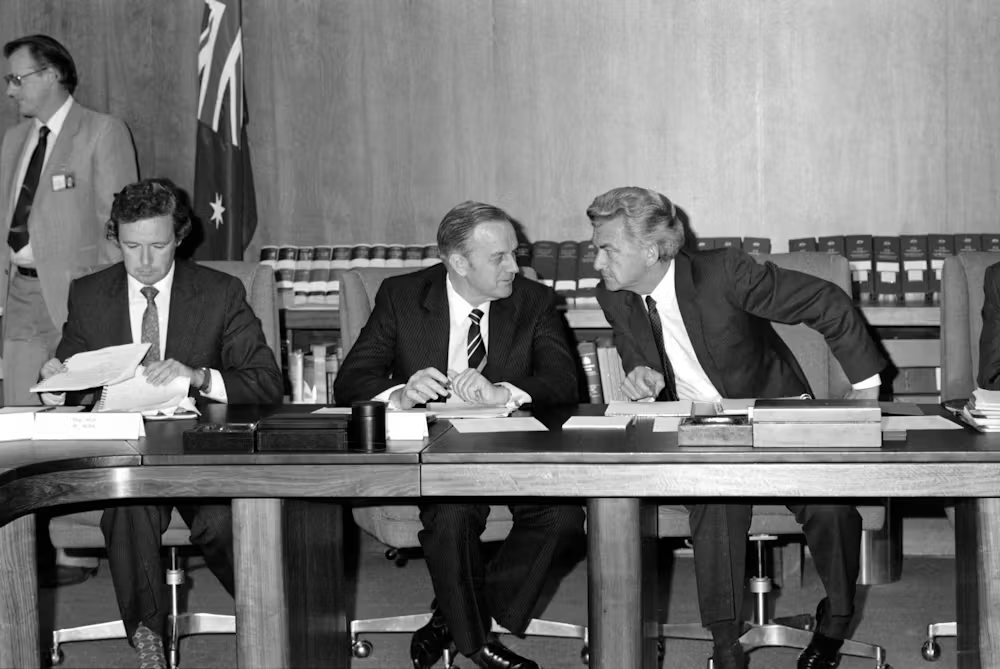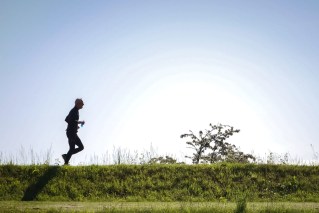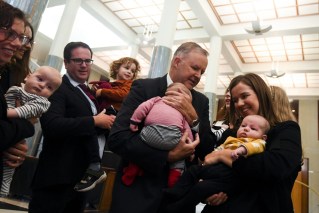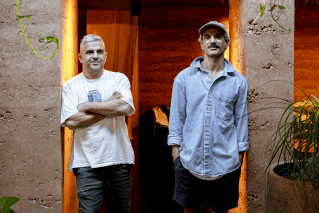Have clip-board, will travel: Why so many Aussie coaches are plotting against us
Controversial, outspoken, a master of mind games … the Wallabies got their man with the sudden signing of Eddie Jones. He may have a league of nations coaching staff but an Aussie in rugby’s top job is merely restoring the balance, writes Jim Tucker.

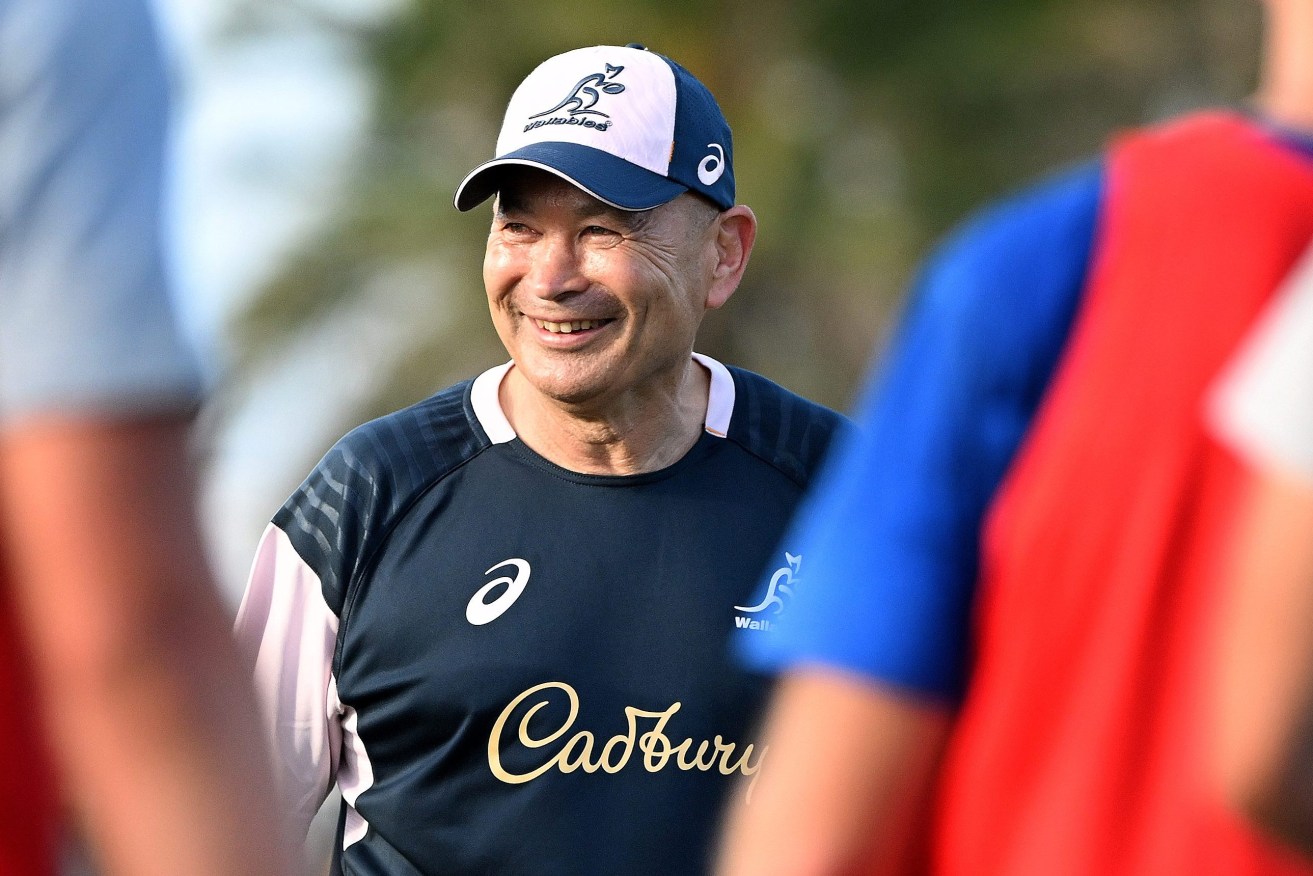
Former head coach Eddie Jones is seen during an Australian Wallabies training session at Sanctuary Cove on the Gold Coast,. Jones will now coach Japan in an agreement that shocked no-one. (AAP Image/Dave Hunt)
Players pledge loyalty to one country. Well, mostly. Coaching is a business without borders, more and more.
Just look at the collection of accents that will be firing orders at the Wallabies this season.
When boss Eddie Jones this week unveiled his full coaching team for this year’s Rugby World Cup campaign there were English and French voices in there. There were even some who speak that foreign tongue of “rugba league” amongst the Australian ones.
There will be some who argue that the large off-field staff isn’t promoting enough Aussie talent, isn’t grooming our aspiring coaches around the country for higher office down the track.
The Jones answer will always be the same. Mate-e-e, you pick the best bloke available for the job.
It happens the world over in sport. South Africans still staunchly coach the Springboks and the All Blacks always back a Kiwi as head man.
Look wider than that and you’ll see two Kiwis (Robbie Deans and Dave Rennie) in the Wallabies’ recent coaching history. Deans didn’t even know the words to Advance Australia Fair when he first came to the job. He learnt soon enough and there’s never been a more Aussie nickname for a coach…”Dingo” Deans.
Equally, we all know Jones had six years as England coach.
Fellow columnist Michael Blucher wrote a revealing column recently about how Australian coach Ange Postecoglou made the tricky job of coaching Scottish football giants Celtic a winner.
Until Graham Arnold coached the Socceroos to the last 16 at football’s 2022 World Cup, there were as many major Dutch influences (Guus Hiddink, Pim Verbeek and Bert van Marwijk) as Australian ones at the helm over the past 20 years.
The England cricket team? Poms, Zimbabweans (Duncan Fletcher and Andy Flower) and an Aussie (Trevor Bayliss) brought their spin to it before the current link with Kiwi Brendon McCullum.
McCullum’s liberating style has been dubbed “Baz Ball” because he’s freed batsmen to go fearlessly for their strokes literally from ball one.
We’ll find out soon enough if a Kiwi-brained English cricket side can be 1-130 at lunch on the first Ashes Test at Edgbaston in mid-June. He’s a sharp, engaging mind who talks cricket, not New Zealand cricket. Nationality doesn’t come into it.
Or what about former England bowling coach, Tasmanian Troy Cooley. The man who built his coaching art around reverse-swing bowling? Unceremoniously sacked by email by Cricket Australia, he is now coaching a new generation of Indian fast bowlers on the sub-continent.
Don’t forget Wayne Bennett. He was at the helm of the England and Great Britain rugby league teams for four years. He actually coached them in more Tests than he did Australia.
As ever, Bennett explained matter-of-factly that he saw no borders, just the challenge of coaching an English team with unfulfilled potential.
“So that’s my job…to try and bring them together and give them a little bit more belief and confidence, take them to the next level,” Bennett said at the time.
Losing to Papua New Guinea was probably not the pinnacle but every coach has one of those moments in his career kitbag.
Bennett does have standards. He coached Australia, England, Queensland and worked with New Zealand but he’s always drawn the line at ever coaching NSW.
Jones is not unlike Bennett. Certainly, dual code international Wendell Sailor sees it that way.
When he was rubbed out of sport for two years for his cocaine ban, both his former coaches checked in to see if he was OK during a dark time.
Jones has always sought out advice and tapped influence from myriad different countries…and sports.
The wisdom of Spain’s master football manager Pep Guardiola is part of the “new Eddie” compared to the one sacked by Rugby Australia after a failed 2005 season.
Jones visited Guardiola when he was still at German football club Bayern Munich before his decorated run began with Manchester City.
“That trip was the big one in terms of changing the way I approach coaching and preparation,” Jones said.
“We used to have two big training sessions a week in rugby and I now gear one to be more physical and one to be faster than the game.
“Everything has to simulate what happens in the game because it’s amazing some rugby teams train as we did 35 years ago … no decision-making, no emphasis on pace and a lack of physicality.
“Even when a top soccer team is playing 45-60 games a year, all the training simulates the game.”
Jones dropped in on a team at the Tour de France to see how they prepared. There’s a constant thread of learning there.
He’s embraced the notion that there is a world of coaching out there so why not invite it in to help better prepare the Wallabies?
That’s the answer to all those critics who roll their eyes that Jones has assembled his coaching support cast with not enough Aussie rugby brains involved.
He has tapped Australian coaches. They are only lesser-known in our minds, not his.
Brad Davis, who will help Jones with the attack, is a former rugby league player from the 1990s and 2000s who played long term in the English Super League. He’s coached rugby for a long period in England and Wales.
“Maul consultant”. Is there such a thing? There is now with Frenchman Pierre-Henry Broncan in that role to refine a key facet for the Wallabies. Forwards co-ordinator Neal Hatley is a Pom and was part of Jones’s off-field team in 2019 when he coached England to the 2019 World Cup final.
Former Wallabies Berrick Barnes (kicking) and Dan Palmer (lineout) offer connections to Wallabies teams of the past. That’s important.
Jones has an off-field staff of 11 when you get to “speed consultant” and “sports scientist.”
Namesake Alan Jones will be one rolling his eyes. He had to beg Rugby Australia to allow him to take one assistant coach with him on the 1984 Grand Slam tour of the United Kingdom and Ireland. Jones even offered to pay for Alec Evans before it got green-lighted. What a choice it was. The multi-skilled Evans was the perfect figure.
Evans was honoured by clubs Souths and Wests at a luncheon at Wests Bulldogs Rugby Club a week ago to celebrate 2022’s honour as a RA Life Member.
It was mentioned more than once, that once at the helm he was “captain for life” for many of the Brisbane Grammar boys he coached, the Queensland and Souths players he captained and Wallabies he moulded.
Past players from Roger Gould to Toutai Kefu to Gary Bird were there. Grammar old boys like Andy McIntyre and Jim Sturgess were there. Andrew Slack said some poignant words. Evans was a life coach. He was the no-mistakes drill sergeant. He was the keeper of the standards.
You want Eddie Jones to have picked the right people to stir the right formula within the Wallabies. If they are better equipped to recommend a good café in London or Paris, so be it.
Jones is still the man in charge to give the Wallabies their unique identity and it must be. “You’ve got to have your own way,” he says.
“You can’t beat the All Blacks by copying their style, you’ve got to back the Australian way.”
We wait.
Jim Tucker has specialised in sport, the wider impacts and features for most of his 40 years writing in the media.
